Sat 26 Mar 2011
Reviewed by David Vineyard: FRANCES PARKINSON KEYES – Station Wagon in Spain.
Posted by Steve under Authors , Bibliographies, Lists & Checklists , Crime Fiction IV , Reviews[16] Comments
FRANCES PARKINSON KEYES – Station Wagon in Spain. Farrar Straus & Cudahy, hardcover, 1959. Paperback reprints include Avon G-1054, 1960; Fawcett Crest 1066, 1967.
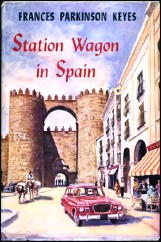
I have to confess, I struggled with Frances Parkinson Keyes (pronounced like skies). I did not want to read her books and I certainly didn’t want to like them.
From the time I started reading heavily my mother, aunt, and cousin — all female — were pushing Keyes at me, and like a mule I balked. I grew up in the South, I did not need more maudlin memories of the Civil War and fading plantations beneath drooping willow trees. I certainly didn’t need them from a conservative Republican author of New England stock and the wife of a conservative Republican senator.
Let us just say that at the time that was enough for me to lay in a stock of garlic, wooden stakes, and a crucifix to protect myself.
Resistance wasn’t easy. Copies of Keyes’ works were everywhere I went, and those three ladies were very persuasive. And Keyes didn’t help. The first time I ate at Antoine’s in New Orleans, all I could think of over the crepe and cherries jubilee was that now I’d have to read Dinner at Antoine’s. Then too, The Chess Players was about the fascinating chess master Paul Morphy who had been a Confederate spy during the Civil War. It was an obvious conspiracy.
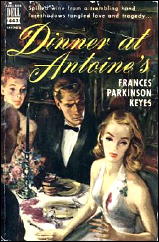
It wasn’t until a ski trip to Red River in New Mexico that fate and Mrs. Keyes caught up to me. I took a nasty spill early that morning on a patch of ice and had a bit of a concussion. The medic told me to go back to the lodge and rest — not sleep — going to sleep alone after a concussion can be the last thing you ever do — just hang around the lodge — under observation lest I slip into a coma — and rest.
Boredom and minor concern — not a good mix.
I don’t know how many of you are familiar with ski lodges, but they are singularly lonely places when the ski slopes are open. There is no television, no radio (unless you like Mariachi music or country western — it was New Mexico after all), and nothing to read. They are designed only for partying apres skiing and sleeping when you can’t party anymore.
There was no bookstore in Red River, not even a paperback kiosk at the convenience store. There may have been a library, but no one at the ski lodge knew where and with over 100 inches of snow on the ground and temperatures in the mid teens I didn’t feel like venturing out exploring. It was starting to snow too.
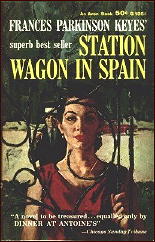
But there she was, with the only book in the entire town apparently — Frances Parkinson Keyes.
With all the resignation of a rabbit about to be eaten by a wolf I sat down to my fate.
I won’t lie to you. It was not the start of a life long love affair. I still resist Southern Plantation novels with the same passion I reserve for cold cauliflower, but grudgingly she won me over. A convert — more of less.
Between 1919 and her death in 1970, Keyes wrote a whole slew of novels, no small number of which were bestsellers. They are primarily women’s books: vivid descriptions of clothes, elegant meals, lace finery, furniture, chandeliers, and social mores mixed with a bit of melodrama and a good deal of history.
Keyes was a prodigious researcher and traveler, largely self educated and endlessly curious. She had a reporter’s eye and a pleasant gossipy style that combined to make the ideal mix for her legions of readers.
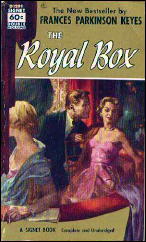
And as it turned out she was a fair to middling mystery and suspense writer.
At least two of her novels are fair play mysteries — Dinner at Antoine’s, which features a well handled change on the least likely suspect theme, and The Royal Box, about a poisoning of an American diplomat in the royal box at London’s Ellen Terry Theater. She also penned three novels of romantic suspense — Victorine, The Heritage, and Station Wagon in Spain.
Station Wagon in Spain, as you have no doubt already figured out, was the book in the lodge.
The hero of the novel, one Allan Lambert, has worked all his life and only recently come into money, and he doesn’t quite know what to do, so when he gets one of those infamous Spanish Prisoner letters (the equivalent of today’s Nigerian con) instead of laughing it off or reporting it to the Postal authorities, he buys a beat up old wood paneled station wagon and ships it to Spain to have a little fun.
This being Keyes, she not only explains what the Spanish Prisoner con was, but gives a nice little history of it dating back to the first instance in 1542 and some idea of how the Postal authorities and Spanish police deal with it.
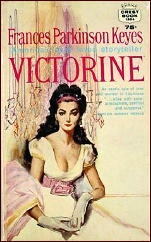
Allan soon finds himself knee deep in murder, politics, criminal gangs, romance, and ancient revenge.
Station Wagon in Spain is an exceptionally good read of its type. Nothing revolutionary, but Keyes’ novelist’s eye adds a depth to the proceedings missing in the standard model. She knows how to choreograph action,, construct a plot, and build to a pay off — in fact the book doesn’t have just one payoff, but two — three if you count the inevitable romance.
They are pretty good payoff’s too — one of them almost Poesque and damn well handled. It has a real edge and more than a touch of that passionate nature so dear to the Spanish character and history.
This isn’t the work of a mainstream novelist slumming in genre fiction.
Well, yes, it’s dated now. Her prose is a little stiff and formal. She lingers over details that her readers loved but most lovers of suspense would as soon skip, and her attitudes are those of a woman of her day, class, and social position — albeit an extremely well traveled and cosmopolitan woman of her time.
She isn’t Leslie Ford, but she’s not exactly Eleanor Roosevelt either.
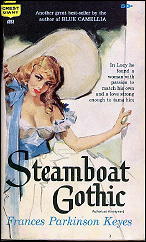
And yes, I have since read a good many of Frances Parkinson Keyes novels — even some of the Southern plantation novels like River Road and Steamboat Gothic.
She was an obsessive and keen researcher, had a travel writer’s eye for the telling detail, a novelist gift for creating comfortable if not compelling characters, and despite her protests to the contrary, a real gift for suspense and mystery plotting.
If you like Helen MacInnes, Martha Albrand, Mary Stewart, Phyllis Whitney, Charlotte Armstrong, or Nora Lofts you might well enjoy her suspense and mystery novels, and if you like historical novels she was one of the masters of that form.
Her work is aimed at her primarily female audience, but there is nothing to keep a man from enjoying them with a little judicious skipping here and there — there is only so much I feel the need to know about Damascus silk, and all that sumptuous descriptions of food remind me of is that I ought to order a pizza for dinner.
I recovered from the concussion — no comments — got back on the ski slopes the next day, and when I got home rounded up all the Keyes novels my family had been pushing on me for years. I still have some of them, battered, dog eared, and once much loved.
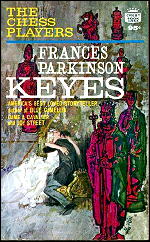
The first one I read was the Paul Morphy novel, The Chess Players.
I enjoyed it too.
If you’re in the mood for fictional comfort food, you could do much worse, and for all her flaws, her virtues still out weigh them. She is largely forgotten today, as the once popular works of past generations generally are, but there are still pleasures to be found, and you will likely feel more than a little appreciation for a time and a writer who appreciated literacy, construction, and respected her readers intelligence.
She was a most literate and accomplished lady.
As best selling writers from the past go, she is still well worth getting acquainted with.
Crime Fiction Bibliography: [Taken from the Revised Crime Fiction IV, by Allen J. Hubin]
KEYES, FRANCES PARKINSON (née Wheeler). 1885-1970.
Dinner at Antoine’s (n.) Messner 1948.
The Royal Box (n.) Messner 1954.
Victorine (n.) Messner 1958.
Station Wagon in Spain (n.) Farrar 1959.
March 26th, 2011 at 7:06 pm
My wife read all the Keyes books she could get her hands on. She still talks about them occasionally. DINNER AT ANTOINE’S is her favorite.
March 26th, 2011 at 8:04 pm
The women in my family were fanatics when it came to Keyes and her books circulated between them from household to household growing increasingly care worn as time passed.
And I can tell you that DINNER AT ANTOINES is virtually a religion among her readers. Actually taking some of them to dinner at Antoines is the equivalent of taking a kid to Disney World.
It’s been a couple of decades, and I don’t know if it is still there post Katrina, but in the day it always lived up to the book; the food and the prices.
And it and THE ROYAL BOX really are fairly good golden age style mystery novels — fair play and all. They are primarily novels and not mysteries (BOX goes on well past the actual solution to the mystery), but present the mystery element with some attention to detail and form.
A few characters appear in both books.
I think one of the things readers loved about Keyes was her attention to detail. Many of her novels begin with a long chatty forward about how she came to write the book, her visits to the locations in it, and her life in general. The result is that you end up feeling you know her in a way you seldom feel with most writers and books.
And she really is a gifted storyteller. That gossipy chatty style, a bit of melodrama, domestic crisis, romance and a bit of scandal, strong female characters, and good if not perfect men, well observed history and sense of place — its almsot a formula for wrting best selling fiction aimed at women readers.
Of course most male readers are going to skip judiciously over the passages describing table settings and the like, but then I suspect a lot of her women readers did too.
March 26th, 2011 at 8:48 pm
Frances Parkinson Keyes is not an author I would ever have expected to show up in this blog. Never ever. I was wrong, and I’m happy as anything to admit it. Thanks, David!
March 26th, 2011 at 9:44 pm
David
I see you mention THE HERITAGE as being a Romantic Suspense novel, but it’s not in Hubin. Would you care to make a case for it, so I can send the suggestion on to him?
Also, the characters that show up in both ANTOINE’S and ROYAL BOX, are they significant enough (especially regarding the criminous aspects) to be considered Series Characters?
March 27th, 2011 at 3:06 am
Steve
At best THE HERITAGE deserves a dash before it.
From the back of the Fawcett Crest edition (MI320)
“For sheer storytelling magic, no writer of our time can surpass the spellbinding power of France Parkinson Keyes. In THE HERITAGE she has created a haunting and suspeseful tale of romantic intrigue.”
In short it’s a slightly classier gothic. Peter Bradford, a young American in Ireland spies a beautiful young woman, they have a passionate night together and then she is gone. Then he finds himself involved in the intrigue revolving around a title and a wealthy Irish estate.
As I said, it’s at best a dash in front, but I do think it qualifies for that. There is no murder, but something of a mystery to be untangled and the Parnell business comes into it (I think the Dorothy Eden book on that one is in Hubin).
No more than associational at best, but I think at least that.
While they are significant, the characters who show up in DINNER and BOX don’t act as detectives in any way. They do tie the two books together, but I really don’t think you could call them series characters. Quite a few of her books have characters who appear as major figures in one book, then show up later as minor figures in another.
March 27th, 2011 at 7:05 am
Yes, of course Antoine’s is still there. We’ve never eaten there, and I haven’t read the book either, but now I might as I love New Orleans.
And I had no idea “Keyes” was meant to rhyme with “Skies” so thanks for that.
March 27th, 2011 at 7:12 am
OK, I put it on hold at the library. Incidentally, despite what certain people (Wikipedia) believe, the Brooklyn Public Library lists 31 books by Keyes in the system.
March 27th, 2011 at 8:58 am
Jeff
Good to know about Antoine’s. I thought it was probably still around, but wasn’t sure.
Great food, but, as I say, pricey. Well worth it though both for the food and atmosphere, and for the rewards if you are taking a female Keyes reader for her first dinner there.
Keyes is still pretty widely read despite being out of print. Amazon has a lot of her books available and I’m sure they are everywhere as I still find them in second hand bookstores, jumble sales, libarary sales, garage sales, and the like.
DINNER and BOX are both pretty good mystery novels — slightly off the form since they are primarily novels, but certainly well within the bounds of the classic detective novel and in both books she did her research.
I don’t want to oversell them, but for a mainstream novelist she did well with the staples.
Though her books are nothing like theirs I was reminded of M.M. Kaye, Elizabeth Bowen, and Dorothy Dunnett, mainstream writers who did some highly entertaining genre novels when they were ‘slumming’ (my term not theirs).
In fact mainstream writers have a much better record in the mystery genre than in science fiction. Norman Mailer, C.P. Snow, Malcolm Muggeridge, Maugham, James Jones, Paul Theroux, Craig Nova (he even wrote a Nick Carter) — not all equal of course or all succesful, but most of them at least interesting.
March 27th, 2011 at 5:29 pm
F.P. Keyes restored the LeCarpentier house in the French Quarter and lived there for many years. See http://www.bkhouse.org/indexnew.html for more information and a tour of the house.
Jan Dean
New Orleans
April 15th, 2011 at 8:11 am
I would have never thought F.P. Keyes was so accomplished a writer. I had dismissed her as fluff. Time to remedy that…
November 8th, 2011 at 8:20 pm
I am thrilled to own first editions of Frances Parkinson Keyes’ books “Dinner at Antoine’s” and “Gothic Steamboat.” My books are my treasures and I am blessed to own these two books. I found both at a second hand store in the French Quarter of New Orleans and LOVE the book store owner. He was a delight.
In the days of vampires and other such nonsense on television these days I highly recommend to my eight grandchildren the gift of reading and push as hard as I can for them to give up on the waste of time they call television.
I am a 57 year old grandmother who is modern as heck but still hold the love of reading dear to my heart.
November 8th, 2011 at 8:24 pm
I forgot to add that my husband and I visited Ms. Keyes’ home in New Orleans and so enjoyed the tour led by the very knowledgable fellow. He even gave us a slate from the roof that blew off during Katrina. We asked a local artist in Michigan where we live to paint a copy of a postcard purchased of the home on it – she did a delightful piece of work!
Blessings and I pray that others will not ever forget her work.
June 1st, 2012 at 7:23 pm
please let me know when the writer of this review of Francis Parkinson Keyes and the adventures in Red River New Mexico was written. I live in Red River and am so interested when he first read Keyes. very entertaining.
June 1st, 2012 at 7:34 pm
Dianne
I don’t know when David read the books, but I’m fairly sure the review was written in 2011. I’ve lost contact with him since then, otherwise he’d be glad to reply to you directly, I’m sure.
— Steve
August 25th, 2012 at 8:20 am
I read the station wagon in spain while staying at my aunt’s house several years ago. Once begun, I could not put it down. The most intriguing part was the amount of fact she had included about the scam. The story is a fun romp. My mother was an avid fan of Keyes and I have read many of those books. I think you should give Keyes her due, without the surprise! She was a fine novelist with a penchant for certain subjects. Novelists don’t write this way today, but then we do not write the way of Fenimore Cooper either, nor do we find books written in the style of Dickens and Shakespeare. That does not discredit those authors. You have written a very good description of her work, and it would be worth it for wickipedia to include it in their work. Thankyou.
February 9th, 2013 at 3:54 pm
I am a big fan of The Heritage and recommend it, especially to fans of Downton Abbey, but I do not think of it as suspense but as historical fiction. Here is a link to my review: http://perfectretort.blogspot.com/2013/02/the-heritage-book-review.html